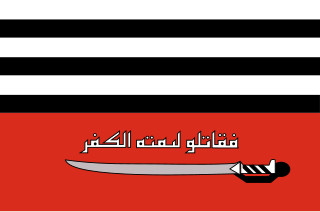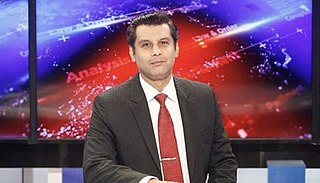
Azam Tariq was a Pakistani politician and Islamic scholar who was the leader of Sipah-e-Sahaba Pakistan (SSP). He was assassinated in 2003.

The situation of human rights in Pakistan is complex as a result of the country's diversity, large population, its status as a developing country and a sovereign Islamic democracy with a mixture of both Islamic and secular law.

The Sipah-e-Sahaba (SS), also known as the Millat-e-Islamiyya (MI), is a banned Sunni Islamist Deobandi organisation in Pakistan. Founded by Pakistani cleric Haq Nawaz Jhangvi in 1989 after breaking away from Sunni Deobandi party Jamiat Ulema-e-Islam (F), it was based in Jhang, Punjab, but had offices in all of Pakistan's provinces and territories. It operated as a federal and provincial political party until it was banned and outlawed as a terrorist organization by Pakistani president Pervez Musharraf in 2002. Even though it has been banned by the Pakistani government on numerous occasions, the Sipah-e-Sahaba has continued to operate under a different name throughout the country; it has significant underground support in Punjab and Khyber Pakhtunkhwa. The organization was also banned by the United Kingdom, where there is a significant Pakistani diaspora population, in 2001.
Sectarian violence in Pakistan refers to violence directed against people and places in Pakistan motivated by antagonism toward the target's religious sect. As many as 4,000 Shia are estimated to have been killed in sectarian attacks in Pakistan between 1987 and 2007, and thousands more Shia have been killed by Salafi extremists from 2008 to 2014, according to Human Rights Watch (HRW). Sunni Sufis and Barelvis have also suffered from some sectarian violence, with attacks on religious shrines killing hundreds of worshippers, and some Deobandi leaders assassinated. Pakistan minority religious groups, including Hindus, Ahmadis, and Christians, have "faced unprecedented insecurity and persecution" in at least two recent years, according to Human Rights Watch. One significant aspect of the attacks in Pakistan is that militants often target their victims places of worship during prayers or religious services in order to maximize fatalities and to "emphasize the religious dimensions of their attack".

Pakistan Sunni Tehreek or simply Sunni Tehreek is a Pakistani Barlevi organization. The organization was founded by Muhammad Saleem Qadri in 1990 in order to prevent Barelevi mosques from being seized by Deobandi and Wahabi organizations. It also sees itself as a defender of Barelvis from attacks from Deobandis and Wahabi Muslims.

The Lashkar-e-Jhangvi, is a Deobandi supremacist, terrorist and militant organisation based in Afghanistan. The organisation operates in Pakistan and Afghanistan and is an offshoot of anti-Shia party Sipah-e-Sahaba Pakistan (SSP). The LeJ was founded by former SSP activists Riaz Basra, Malik Ishaq, Akram Lahori, and Ghulam Rasool Shah.
Jamia Uloom-ul-Islamia is an Islamic University in Banoori Town, Karachi, Pakistan. The university continues the tradition of the Darul Uloom system initiated by Darul Uloom Deoband. As of 2007, there are about twelve thousand students in different departments of the Jamiah and its branches, including a number of foreign students from over sixty countries.
Dr. Athar Ali was a Pakistani system engineer and a rocket scientist who was murdered in Karachi on 4 October 2003. He was an expert in missile technology and was the senior scientist at the Space and Upper Atmosphere Research Commission (SUPARCO) during the time of the development of Shaheen missile guidance system. SUPARCO is a Pakistani governmental agency. His death led to the mass demonstration in a Shiite community in Karachi.
Events from the year 2010 in Pakistan.
The 2010 Karachi riots started on August 3, 2010, after the assassination of Parliament member Raza Haider, a member of the Muttahida Qaumi Movement political party, on the night of August 2, 2010, in Karachi, Pakistan. The Muttahida Qaumi Movement (MQM) blamed the Awami National Party, it's political rival, for the killing. Haider, was killed as he attended a funeral at a mosque.
Events in the year 2011 in Pakistan.
Wali Khan Babar was a Pakistani journalist working for GEO News who was killed by gunmen in the Liaquatabad area of Karachi. His murderers Saulat Mirza and Faisal Mota are sentenced to death by the court on March 10, 2015. According to the Committee to Protect Journalists, Babar was the first journalist it had confirmed killed in a work-related death in 2011. Pakistan was the deadliest country for journalists in 2010. Despite the murders of several people associated with the investigation and the death of an accused, in March 2014 four people were convicted and sentenced to life imprisonment for the murder, and two others were given death sentences in absentia.
This is a list of terrorist incidents in Pakistan in 2004.
This is a list of terrorist incidents in Pakistan in 2005.

Arshad Sharif was a Pakistani journalist, writer, and news anchor. He specialized in investigative journalism and covered many political events in the country for national and international news organisations. On 23 March 2019, he was awarded the Pride of Performance by the President of Pakistan Arif Alvi, for his contribution to journalism. He was shot and killed by police in Kenya on 22 October 2022. A 592-page report by the Pakistani Federal Investigation Agency (FIA) revealed the killing to be a “planned targeted assassination," claiming that Kenyan police were "used as instruments." He was an outspoken critic of the Pakistani army.

Hazaras have experienced a series of ethnically or religiously motivated attacks in Quetta, Pakistan.
This is a list of terrorist incidents in Pakistan in 2013. Some of the incidents are sectarian in nature and the TTP is responsible for a majority of them.
Malik Mumtaz Hussain Qadri, better known as Mumtaz Qadri, was a Pakistani Elite Police commando who is known for murdering Salmaan Taseer, Governor of Punjab. Qadri was a commando of the Elite Police and, at the time of the assassination, a member of the squad of personal bodyguards assigned to protect Taseer. A follower of the Barelvi version of Sunni Islam, he assassinated Taseer on 4 January 2011. He claimed to have killed the Governor because Taseer spoke in defense of Asia Bibi, a Pakistani Christian woman convicted of blasphemy and sentenced to death. Qadri was convicted by the Islamabad High Court, sentenced to death and hanged in February 2016.

Persecution of Sufis over the course of centuries has included acts of religious discrimination, persecution, and violence both by Sunni and Shia Muslims, such as destruction of Sufi shrines, tombs and mosques, suppression of Sufi orders, murder, and terrorism against adherents of Sufism in a number of Muslim-majority countries. The Republic of Turkey banned all Sufi orders and abolished their institutions in 1925, after Sufis opposed the new secular order. The Islamic Republic of Iran has harassed Sufis, reportedly for their lack of support for the government doctrine of "governance of the jurist".
MQM militancy refers to militancy in Pakistan associated with the Muttahida Qaumi Movement party.










